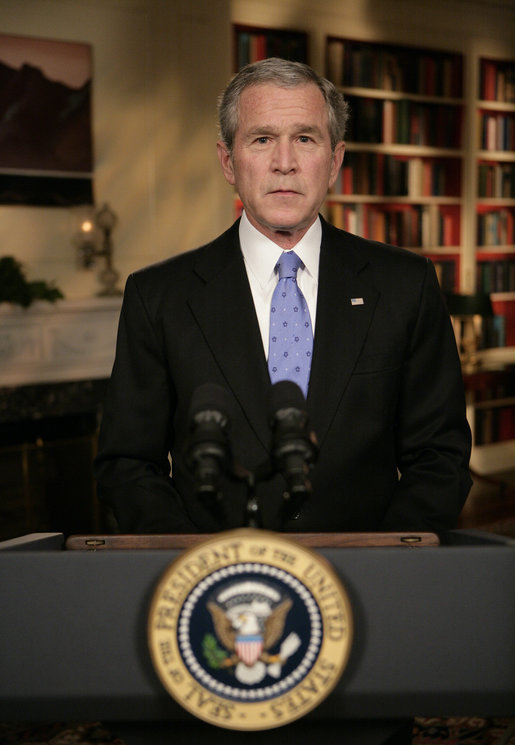
“Our troops in Iraq have fought bravely. They have done everything we have asked them to do. Where mistakes have been made, the responsibility rests with me.” I’m still furiously playing catch-up, so I’m obviously a day or two behind on blogging this…Then again, Dubya’s just as obviously three or four years behind in announcing it, so I’ll call it a wash. Nonetheless, after finally admitting that his administration has seriously screwed up in Iraq, Bush — sidestepping the suggestions of the Baker-Hamilton commission — calls for sending 21,500 more troops to the region, in what’s being billed as a “surge.” (Re: “escalation.”) When you get right down to it, Dubya’s basic argument in his televised address on Wednesday was this: “Through wishful thinking and outright incompetence, I’ve dug two nations into a huge hole. Please, please, please let me keep digging…“
Here’s the thing — A massive troop increase would’ve made a good deal of sense in 2003, during those crucial days just after the fall of the Hussein regime. A show of power then — and a quicker restoration of order and basic services — would have paid huge dividends down the road. But, now, all these years later, after so much infrastructure has been destroyed and so many sectarian schisms have been allowed to fester? 21,500 troops — many of them not fresh recruits but wearied soldiers returning to the region or having their tours extended — isn’t going to make a dent in the Whack-a-Mole game we’ve been playing against insurgents since 2003. At best, this escalation is a show of good faith to the al-Maliki government, which seems to be not much more than a brittle political arm of Shiite extremists (Exhibit A: the manner of Saddam’s hanging; Exhibit B: the refusal to do anything — until now — to rein in Al Sadr’s Mahdi Army.) Yes, folks, throwing more troops at a losing situation, backing a shaky government that can’t handle its own security issues, rattling the saber at Cambodia/Iran…who says Dubya isn’t a student of history?
Fortunately, for the first time since the beginning of the war, Congress isn’t having it, with even some Republicans joining Dems in rallying against the proposed troop increase and today venting their wrath at Condi Rice before the Senate Foreign Relations Committee. (No doubt the poll numbers against Dubya’s plan is helping to stiffen some GOP spines.) Still, Dubya has some allies in this fight — While the Dems are universally opposed to the escalation gamble [Dem Response by Durbin | Biden | Clinton | Dodd | Edwards | Feingold | Obama | Pelosi] and a not-insubstantial number of Republicans are balking, some key GOP pols are still supporting Dubya’s move (most notably John McCain, who’s been calling for a troop increase since day one, and Rudy Giuliani, likely trying to right the 2008 ship after his recent devastating document dump.)

